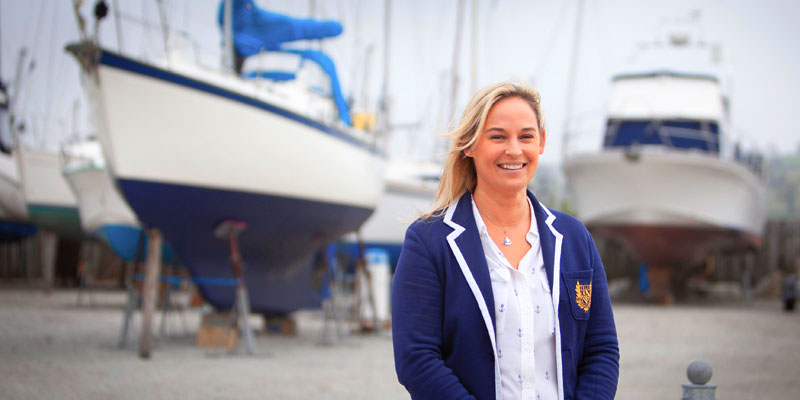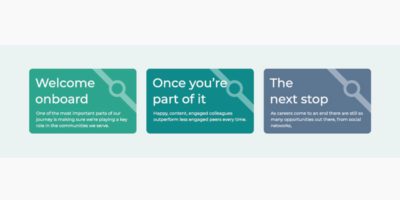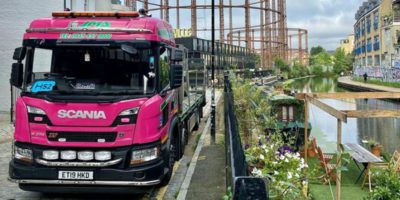Dr Rachel Nicholls-Lee is a research fellow at the University of Exeter, investigating dynamic submarine power cables supporting the Engineering and Physical Sciences Research Council (EPSRC) Supergen ORE Hub. Rachel has extensive experience of marine renewable energy and yacht design, having worked both in industry and academia. She completed a PhD in tidal energy at the University of Southampton and is a Chartered Engineer.
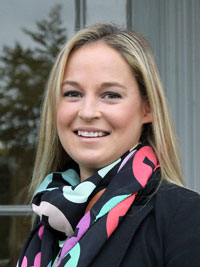
“There is so much evidence across the board these days that investing in women is the most effective way to lift communities, companies, and even countries. Countries with more better gender equality have improved economic growth, companies with more women in senior roles often perform better.”
From yacht design to maritime renewables
I completed a Master of Engineering in ship science, yacht, and small craft at the University of Southampton in 2004.
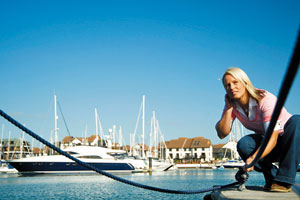
I also completed a research assistantship alongside my PhD, helping a team develop a lightweight, composite, cryogenic, heavy lift, remote control buoyancy system.
Upon completion of both these, I started a research fellowship which was aimed at taking the findings from my PhD further. After a year, I got offered a position in industry at a renewable energy consultancy in Cornwall, and I moved down to join the company.
My work here involved undertaking research and development projects, developing new technology and marine renewable energy devices and platforms, and supporting the offshore team with operations and projects at sea with all the underlying calculations that ensure safe operations are carried out.
Three years into this I took a plunge and started my own naval architecture consultancy, which I ran for five years. The projects I was involved with were very varied and included everything from the design of a pure-electric superyacht tender; development of a novel, autonomous, hybrid-powered trimaran; and continued involvement in marine renewables research and development, as well as other staple naval architecture tasks such as inclining tests and stability analysis.
I then went back into academia and started my current research fellowship at the University of Exeter in March 2020 and am still here!
Getting involved to make a difference
Throughout this time, I also became a Chartered Engineer through the Royal Institution of Naval Architects (RINA), and a Chartered Marine Engineer through the Institute of Marine Engineering Science and Technology (IMarEST).
I’ve also undertaken several voluntary roles and outreach projects through the years too. Currently, I am the vice-chair of the board of trustees of IMarEST, as well as being their diversity and inclusion champion, a member of the Devon and Cornwall joint branch of RINA and IMarEST (for whom I undertake professional review interviews for candidates applying for CEng and IEng), a member of the board of directors of Cornwall Marine Network and member of the Coastguard Rescue Service as part of the Falmouth Coastguard Rescue Team.
My research
My role as a research fellow is very varied, which is why I really enjoy it. Every day, I can present different tasks and challenges from complex computational analyses requiring large supercomputers to solve, to general project management and planning, liaison with industrial partners, writing conference and journal papers to disseminate my work, and compilation of funding proposals. I’m also working towards a teaching qualification in higher education.
My research is currently focused on dynamic subsea power cables, for the offshore renewable energy sector, and trying to achieve a much better understanding of how these complex structures react and respond in a highly energetic subsea environment.
Subsea power cables are well understood electrically; however, until recently they were simply buried and held static, so the structural connotations of operating in a highly dynamic environment attached to floating renewable energy platforms, for example, and the impact on the life span of the cables are relative unknowns. It is this I am trying to improve though numerical modelling, and physical testing.
I really enjoy working on projects where I can see that there may be a chance for my work to make a difference, and with this research I hope that my work will provide vital information to help improve and optimise future cable designs and ultimately make floating offshore renewables more robust and cost-effective and a major part of the future energy mix.
Working remotely during lockdown 1
COVID-19 hasn’t had a major impact on my work. I started the role a couple of weeks before the first lockdown, so I wasn’t in the office for long before we were all sent home.
The upside is that I was already used to working on my own, from home, as I had been for five years previously. Fortunately, superfast broadband had been rolled out early in Cornwall, so I had a really good Internet connection.
The downside was that it was challenging to get to know people in the department as my project only has me working on it, so being at home meant I didn’t get to enjoy normal office socialisation. We did, however, have lots of online seminars and talks, and even Friday drinks after work so I did meet some of the department at these!
Experimental work was challenging at first, but the university worked hard to get us access to the labs again which was great, so there have been delays but not too severe. Conferences and seminars went online, so still happened; though I think the networking side of events such as these is rather challenging to achieve in a virtual environment, and it will be good to get back to doing a few more face-to-face events in the future.
Rebalancing the marine industry
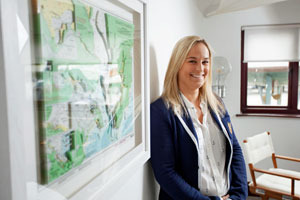
There are lots of small things that the sector could be doing to attract more women, like by changing the language we use. Language in the maritime sector is heavily male-dominated, like talking about ‘unmanned’ ships and ‘seamen’ etc. Such language unintentionally suggests that women don’t belong in the maritime sector.
I also feel that more could be done to identify and promote female role models – younger women and girls aren’t going to aspire to be something they cannot see or do not know exists.
Personally, in my role as a diversity and inclusion champion within the profession, and through my membership of professional institutions, there are opportunities to help influence the profession and even engage in the development to governmental level policies – so perhaps I may be able to help improve the balance in a small way.
Bringing the female perspective, and with it the bigger picture
There is so much evidence across the board these days that investing in women is the most effective way to lift communities, companies, and even countries. Countries with better gender equality have improved economic growth, companies with more women in senior roles often perform better.
This is all true for STEM careers and roles too – possibly even more so as the industry is so male-skewed. Women tend to think differently about problems, considering more facets before deciding, incorporating more information, and viewing the big picture. While there is a time and place for focus on specifics, an inherent drive to understand the bigger picture is, I believe, key to the success of innovation in STEM.
The transformed UK Athena SWAN charter
I think the inclusion of recommendations from consultation with a broad spectrum of the sector has really improved the transformed UK Athena SWAN charter. We are beginning to see the inclusion of metrics enabling institutions to be able to benchmark their culture against national data, which I feel is essential to be able to support cultural and behavioural change – not just around gender equality, but equality and diversity in all its forms.
Realistically, being in the engineering discipline, retaining female talent in academia is a challenge for two reasons:
1) it can be considered as positive discrimination, and while there is a place for offering incentives to so-called minority groups, this does not improve office politics;
2) the talent simply isn’t there.
The former can be achieved through true equity (and I used the word equity, not equality, such that the support and resources are shared based on what each individual needs in order to level the playing field) – giving all postgrads the same opportunities and support through these no matter what is integral. Not prioritising a large project because it shouts louder, so to speak, over a small project with perhaps a single female postdoc working on it, for example.
With regards to the latter, there is a huge shortage of good, female, candidates in the engineering world (both in academia and industry), but I feel the root of this problem goes a long way back from degrees, A-levels and even GCSEs.
Let’s not only reach out to young girls, but also their parents!
Having been involved in outreach at various level throughout my career, it has become apparent that encouraging girls into STEM as early as possible is key. We’re talking two, three, four years old here, perhaps even younger. There is research showing that even by six years old, many girls are put off so-called “boys’” subjects.
One of the key factors here is, I think, parental encouragement (or perhaps discouragement would be a better word to use). No young girls are going to want to disappoint their parents, and there is still a strong prevailing attitude that STEM subjects and careers are not for girls.
Perhaps we need to focus our outreach efforts on the parents, and not just the girls themselves, in order to help them understand and engage more and ultimately support their daughters in whichever course of study they wish to pursue, and not caving to that which their parents thin is acceptable for them to follow.
Challenging conventions in academia
I also feel that more (or perhaps even just some) support from academic institutions and funding bodies for those people who have, perhaps, spent some time in industry would be helpful.
While, at present, there are fellowships and grants for women who have had career breaks related to childcare or illness, there is a lack of support for those of us who have been in industry for several years.
For example, despite the fact I am defined as an early career researcher due to having limited academic positions after finishing my PhD, I am now not eligible to apply for many early career researcher fellowships as it has been too long since I completed my PhD.
The years I spent in industry do not count as an academic career break, however the skills and abilities, connections, and qualifications I have obtained during this time are almost shunned by academia – it’s like eight years of my life have been wasted.
I can only imagine this would put women off returning to academia should they be considering it after a period in industry. More support across the board is required here, for all genders.
Looking forward
Work-wise, I’ve got some large-scale cable testing coming up in the New Year, which is exciting as I will be using it to compare against the results of my numerical models and hopefully validate them to some degree.
I also have the International Ship and Offshore Structures Congress to look forward to in September in Canada. I’m a member of the Special Vessels Committee, where experts in the field from around the globe compile a report summarising the previous three years of research in the world and make recommendations for the direction of future research.
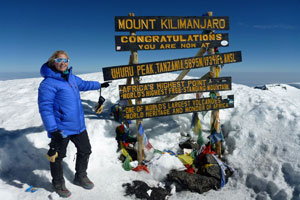
Longer-term, my aim is to one day climb all of the seven summits – Kilimanjaro, Elbrus, Aconcagua, Vinson, Cartenz Pyramid, Denali, and Everest.
https://www.linkedin.com/in/rachelnichollslee/
https://twitter.com/renewables_uoe

